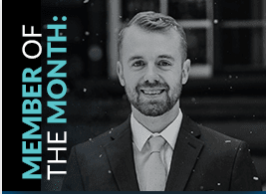A4M valued member Corey Deacon, DNM, MSC shares insight from his professional experience in this Member of the Month feature.
Dr. Corey Deacon is a co-founder of Neurvana Health, is a Doctorate of Natural Medicine, neuroscientist and a passionate health consultant. Dr. Corey was managing clinician of the  Brain Treatment Centre of Alberta for 3 years prior to co-founding Neurvana Health, where he currently acts as director; leading research and applications for health practices. All the above experience has led him to create the model of health he currently implements and continues building on a daily basis.
Brain Treatment Centre of Alberta for 3 years prior to co-founding Neurvana Health, where he currently acts as director; leading research and applications for health practices. All the above experience has led him to create the model of health he currently implements and continues building on a daily basis.
Dr. Corey integrates functional medicine with quantitative EEG brain analysis to not only assess and diagnose precisely what issues people are dealing with but also what is causing them. This allows for resolution of symptoms without simply blocking them. After mapping thousands of brains in conjunction with biomedical data, biochemistry, hormones, genetics, family & ancestral history and other markers he has developed a one-of-a-kind diagnostic program that pinpoints precise problems and what is causing them in any given dis-ease, symptoms, or complaints.
Q1: Before joining A4M, what was your medical background?
My background was in research in biomedical sciences with a specialty in neuroscience. I then became board-certified in Neurofeedback and quantitative EEG and obtained my Doctorate in Natural Medicine.
Q2: What anti-aging techniques have you incorporated into your practice? And how did you so?
We incorporate nutraceuticals, nutrition, genomics, neurofeedback/biofeedback, BHRT, peptides, photobiomodulation, IV therapy and stress reduction techniques.
Q3: What are the benefits of practicing anti-aging medicine? (as a professional, and for your practice?)
The benefits of anti-aging medicine techniques is the ability to address the causes of aging and disease rather than just attempting to treat the symptoms as they occur. This gives people hope in combination with long-lasting effective relief from problems associated with aging. Predictive genomics along with family/patient history also allows prevention and maintenance protocols to be utilized so people can be confident they are reducing their risk for diseases associated with aging before they occur.
Q4: What are the changes you see in your patients?
Because we work mainly with people with chronic diseases, we see stability and many times incredible improvements in diseases originally thought to be irreversible. People move forward in life with higher quality of life and confidence that they have control of their health.
Q5: Why would you recommend Anti-Aging Medicine to your peers?
I recommend Anti-aging medicine because we currently live in a society that has focused on acute care and has failed chronic conditions including conditions associated with aging. We need to have a focus on regenerative techniques as well as preventative protocols to decrease the toll that chronic disease has on the world emotionally, socially, and economically.
Q6: Where do you see the future of Anti-Aging medicine 20 years from now?
I see anti-aging medicine being the standard of care in 20 years; focusing on prevention, maintenance, and regeneration rather than just the focus on treatment of symptoms.

